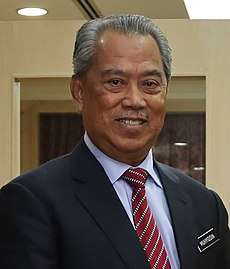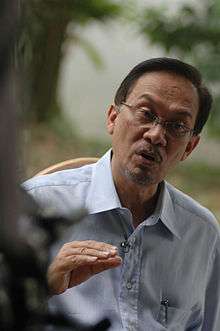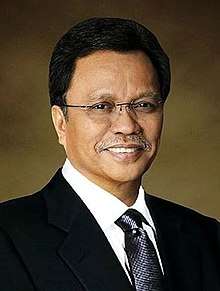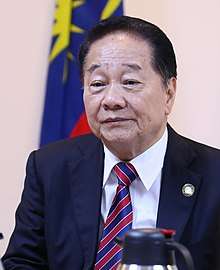Next Malaysian general election
The next Malaysian general election, formally the 15th Malaysian general election, is scheduled to be held on or before 16 September 2023 to elect the members of the Dewan Rakyat in the 15th Parliament of Malaysia. All 222 seats will be up for election, presuming no constituencies are added or removed in a redistribution. As the 14th Parliament first sat on 16 July 2018,[1] it will automatically be dissolved on 16 July 2023 if not dissolved earlier. Traditionally, elections for all state legislatures (except Sarawak's) are also held concurrently.
| |||||||||||||||||||||||||||||||||||||||||||||||||||||||||||||||||
All 222 seats in the Dewan Rakyat 112 seats needed for a majority | |||||||||||||||||||||||||||||||||||||||||||||||||||||||||||||||||
|---|---|---|---|---|---|---|---|---|---|---|---|---|---|---|---|---|---|---|---|---|---|---|---|---|---|---|---|---|---|---|---|---|---|---|---|---|---|---|---|---|---|---|---|---|---|---|---|---|---|---|---|---|---|---|---|---|---|---|---|---|---|---|---|---|---|
| |||||||||||||||||||||||||||||||||||||||||||||||||||||||||||||||||
| |||||||||||||||||||||||||||||||||||||||||||||||||||||||||||||||||
The prospect of an early federal election in 2020 remains high due to the ongoing political crisis.[2][3] As the states can dissolve their legislatures independently from Parliament, It is unclear which (if any) states will concurrently hold elections for their legislatures if Parliament is dissolved early.
Background
Previous election
The 2018 federal election resulted in a change in government for the first time in Malaysian history since direct elections were first held in 1955. Pakatan Harapan, then a centre-left coalition between four parties, won 113 seats in the Dewan Rakyat (a two-seat majority) against the right-wing Barisan Nasional coalition, which won 79 seats. Pakatan Harapan entered government at the federal level with support from the Sabah Heritage Party. The concurrent state elections also saw Pakatan Harapan winning a majority for the first time in Johor, Malacca and Negeri Sembilan. Hung parliaments were recorded in Kedah, Perak and Sabah, but changes in party membership of the legislators after the election allowed Pakatan Harapan (or the Sabah Heritage Party in Sabah) to enter government in these states as well.
Significant events
In July 2019, the Constitution (Amendment) Act 2019, which contained provisions to lower the voting age to 18 and allow for the automatic registration of voters, was enacted by Parliament.[4] However, that provision is not yet in effect and is awaiting a proclamation by the Yang di-Pertuan Agong. The Election Commission announced in June 2020 that preparations for these changes will be ready by July 2021.[5]
The legitimacy of the redelineation of electoral boundaries for the entire country in 2018 was in 2019 under review by the Election Commission[6], which is under the jurisdiction of the Prime Minister's Department. The redelineation was approved 2 months before the previous election, which saw enormous malapportionment between constituencies. For example, in Selangor, Sabak Bernam has approximately 40,000 voters but Bangi contains 180,000 voters. However, any early redistribution would require a constitutional amendment, which necessitates a two-thirds majority in the Dewan Rakyat[7] The status of the review is currently unknown due to the change in government during the political crisis described below.
2020 political crisis
In late February 2020, Prime Minister Mahathir Mohamad resigned, creating a power vacuum in the executive branch. A majority of the 32 members of the Malaysian United Indigenous Party withdrew from the governing Pakatan Harapan-led coalition government, causing it to lose its majority in the Dewan Rakyat, and partnered with the Barisan Nasional. On 1 March, Muhyiddin Yassin was appointed Prime Minister, and a Malaysian United Indigenous Party and Barisan Nasional-led minority government was formed.
Electoral system
Elections in Malaysia are conducted at the federal and state levels. Federal elections elect members of the Dewan Rakyat, the lower house of Parliament, while state elections in each of the 13 states elect members of their respective state legislative assembly. As Malaysia follows the Westminster system of government, the head of government (Prime Minister at the federal level and the Menteri Besar/Chief Ministers at the state level) is the person who commands the confidence of the majority of members in the respective legislature – this is normally the leader of the party or coalition with the majority of seats in the legislature.
The Dewan Rakyat consists of 222 members, known as Members of Parliament (MPs), that are elected for five-year terms. Each MP is elected from a single-member constituencies using the first-past-the-post voting system; each constituency contains approximately an equal number of voters. If one party obtains a majority of seats, then that party is entitled to form the government, with its leader becoming the Prime Minister. In the event of a hung parliament, where no single party obtains the majority of seats, the government may still form through a coalition or a confidence and supply agreement with other parties. In practice, coalitions and alliances in Malaysia generally persist between elections, and member parties do not normally contest for the same seats.
The voting age is currently 21[8][9] although the age of majority in the country is 18.[10] Malaysia does not currently practice compulsory voting and automatic voter registration. While the Constitution (Amendment) Act 2019 that provided for the voting age to be lowered to 18 and for automatic registration of voters was enacted in July 2019,[11] that provision has not commenced and is awaiting a proclamation by the Yang di-Pertuan Agong. The Election Commission of Malaysia, which conducts federal and state elections, stated in June 2020 that preparations for these changes will be ready by July 2021.[5] The Election Commission is under the jurisdiction of the Prime Minister's Department.
Timeline
Dissolution of parliament
The 14th Parliament of Malaysia will automatically dissolve on 16 July 2023. The first meeting of the first session of the 14th Parliament of Malaysia was held on 16 July 2018.[12]
The Constitution of Malaysia requires that a general election to be held in the fifth calendar year after the first sitting unless it is dissolved earlier by the Yang di-Pertuan Agong due to a motion of no confidence, loss of supply or at the request of the Prime Minister.
Dissolution of state legislative assemblies
While any state may dissolve its legislature independently of Parliament, most state assemblies traditionally dissolve simultaneously with Parliament. In accordance with Malaysian law, Parliament as well as the legislative assemblies of each state would automatically dissolve on the fifth anniversary of the first sitting, and elections must be held within sixty days of the dissolution (ninety days in East Malaysia), unless dissolved prior to that date by their respective heads of state on the advice of their heads of government.
Below are the dates of which the legislative assembly of each state would automatically dissolve:
| Legislature (and term number) | Term start | Refs | Term end (on or before) |
Next election day (on or before) |
|---|---|---|---|---|
| 7 June 2016 | [13] | 7 June 2021 | 7 September 2021 | |
| 26 June 2018 | [14] | 26 June 2023 | 26 August 2023 | |
| 28 June 2018 | [15] | 28 June 2023 | 28 August 2023 | |
| 28 June 2018 | [16] | 28 June 2023 | 28 August 2023 | |
| 1 July 2018 | [17] | 1 July 2023 | 1 September 2023 | |
| 2 July 2018 | [18] | 2 July 2023 | 2 September 2023 | |
| 2 July 2018 | [19] | 2 July 2023 | 2 September 2023 | |
| 3 July 2018 | [20] | 3 July 2023 | 3 September 2023 | |
| 4 July 2018 | [21] | 4 July 2023 | 4 September 2023 | |
| 11 June 2018 | [22] | 11 June 2023 | 11 September 2023 | |
| 19 July 2018 | [23] | 19 July 2023 | 19 September 2023 | |
| 20 July 2018 | [24] | 20 July 2023 | 20 September 2023 | |
| 2 August 2018 | [25] | 2 August 2023 | 2 October 2023 |
Notes
- Perikatan Nasional was a new alliance formed from several existing parties during the 2020 political crisis. The component parties (UMNO, MCA, MIC, PBRS, PPBM, PAS, PBB, PRS, SUPP, PDP, PBS and STAR) held a collective total of 110 seats at the 2018 election.
- Wong Soon Koh sits as an MLA in the Sarawak State Legislative Assembly for Bawang Assan. Masir Kujat, MP for Sri Aman, is the PSB leader in the Dewan Rakyat.
References
- "Proclamation - Summon the Parliament [P.U. (A) 139/2018]" (PDF). Attorney General's Chamber of Malaysia. 13 June 2018.
- Teoh, Shannon (12 June 2020). "Malaysia PM Muhyiddin Yassin looks to snap polls to end battle with predecessor Mahathir". The Straits Times. Retrieved 13 June 2020.
- Soo, Wern Jun (12 June 2020). "Report: Snap polls talk gains momentum in Malaysia | Malay Mail". Malay Mail. Archived from the original on 13 June 2020. Retrieved 13 June 2020.
- Martin Carvalho; Hemananthani Sivanandam; Rahimy Rahim; Tarrence Tan (16 July 2019). "Dewan Rakyat passes Bill to amend Federal Constitution to lower voting age to 18". The Star. Retrieved 16 July 2019.
- "Kenyataan media - Pendaftaran pengundi 18 tahun" (PDF). Election Commission of Malaysia (in Malay). 7 June 2020. Archived (PDF) from the original on 13 June 2020. Retrieved 13 June 2020.
- March 2019, Published 6 months ago on 14. "EC to review redelineation of electoral boundaries approved last year | Malay Mail". www.malaymail.com. Retrieved 20 September 2019.
- "Next redelineation exercise only due in 2026, says Hanipa". The Star Online. 22 November 2018. Retrieved 20 September 2019.
- Nandini Balakrishnan (28 September 2016). "Here's The Fastest Way To Register As A Voter Before The Next Elections". Says.com. Retrieved 9 May 2018.
Qualifications needed to register as a voter in Malaysia:
a) A Malaysian citizen above the age of 21.
b) A resident of an election constituency.
c) Is not disqualified by any laws. - "A Young Malaysian's Guide to the Election". Juice. 30 March 2018. Retrieved 9 May 2018.
You are not eligible to register if you are:
a) on the qualifying date, you are serving jail term or detained as a person of unsound mind.
b) before the qualifying date, you have been convicted or sentenced to death or serving a jail term of more than 12 months and you're still liable on the qualifying date.
c) found guilty under the Election Offences Act, 1954.
d) have a foreign citizenship (Malaysian citizenship law does not permit a Malaysian to carry dual citizenship). - "Age of Majority Act 1971". The Commissioner of Law Revision, Malaysia. 22 April 1971. Retrieved 9 May 2018.
- Martin Carvalho; Hemananthani Sivanandam; Rahimy Rahim; Tarrence Tan (16 July 2019). "Dewan Rakyat passes Bill to amend Federal Constitution to lower voting age to 18". The Star. Retrieved 16 July 2019.
- "Proclamation - Summon the Parliament [P.U. (A) 139/2018]" (PDF). Attorney General's Chamber of Malaysia. 13 June 2018.
- "All 82 assemblypersons sworn in". BorneoPost Online. 8 June 2016. Retrieved 9 August 2018.
- "All but one of 56 Selangor assemblymen sworn in". theSundaily. 26 June 2018. Retrieved 9 August 2018.
- "56 Johor assemblyman sworn in today". theSundaily. 29 June 2018. Retrieved 9 August 2018.
- "Abdullah appointed as Kelantan State Assembly Speaker". theSundaily. 28 June 2018. Retrieved 9 August 2018.
- "32 Terengganu assemblymen sworn in". Malay Mail. 1 July 2018. Retrieved 9 August 2018.
- "Pengerusi Amanah negeri angkat sumpah Speaker DUN". Utusan Online. 2 July 2018. Archived from the original on 22 October 2018. Retrieved 9 August 2018.
- "Forty Pahang reps sworn in". Malaysiakini. 2 July 2018. Retrieved 9 August 2018.
- "Ngeh appointed Perak state assembly speaker". Malaysiakini. 3 July 2018. Retrieved 9 August 2018.
- "Kedah gets a Speaker at last". The Star Online. 5 July 2017. Retrieved 9 August 2018.
- "Shafie wins vote of confidence in Sabah assembly". The Star Online. 11 June 2018. Retrieved 9 August 2018.
- "Omar Jaafar elected speaker of Malacca state assembly". thesundaily. 19 July 2018. Retrieved 9 August 2018.
- "Hamdan re-elected as Speaker of Perlis Legislative Assembly". The Star Online. 21 July 2018. Retrieved 9 August 2018.
- "Law Choo Kiang elected Penang speaker for second term". The Malaysian Times. 2 August 2018. Retrieved 9 August 2018.




